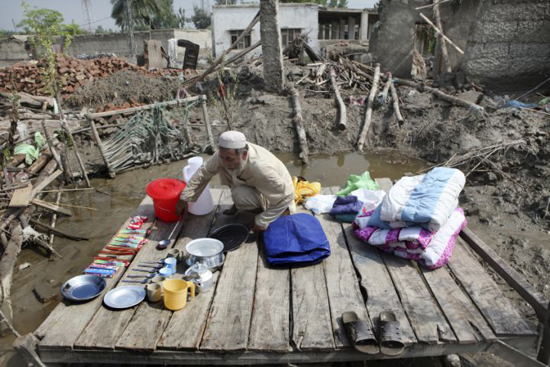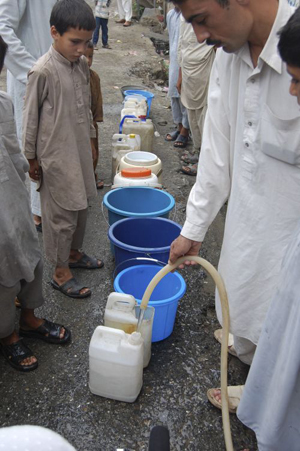"We are doing our best to help people, but above all they are helping each other,” said an MSF assistant project coordinator.

Pakistan 2010 © Ton Koene
On the ruins of what used to be his home, a man lays out items received during an MSF non-food item distribution at a camp between Peshawar and Charsadda.
“I walked from Gul Bela, a village nearby, to come here,” says a woman named Farida as her five-year-old son tugs impatiently at her dress. She's in Nazirabad in Khyber Pakhtunkhwa province, where Doctors Without Borders/Médecins Sans Frontières (MSF) is conducting another round of relief item distributions. “I heard people talk about it around a health center in my village that MSF has been supporting since displaced people arrived from the areas affected by conflict. These women and I haven’t registered our names but we are still hoping to get something because our homes are completely destroyed and our men are sick from drinking bad water.The floods have left us with nothing.”
The overcast morning sky suggests that more rainfall is likely. “He wants to know why we can’t go home,” Farida says of her son. “I don’t know what to say, so I just tell him that we’re going somewhere new.”
The floods that overwhelmed Pakistan more than two weeks ago forced many to leave their homes before they could salvage anything. More painfully, some lost family members. “The water came into our home at night and we had to swim out as quickly as possible,” says Nizam Ali, another of the displaced. “I carried my baby boy on my shoulders. This flood has taken everything away from me, including one of my girls. She breathed in too much water and couldn’t make it.”
Despite his loss, Ali is still looking out for his other children, and he hoists the tent, kitchen set, and hygiene material that MSF is distributing onto his shoulders. The packages are tailored to fit a variety of needs. A typical MSF relief kit could include clothes, soap, toothbrushes, towels, buckets, a jerry can, plastic sheeting, cotton mattresses, and water purification tablets. To date, MSF had distributed kits to more than 8,000 families in Khyber Pakhtunkhwa and Balochistan provinces.

Pakistan 2010 © Jean-Marc Jacobs/MSF
MSF is distributing clean water in Mingora, the capital of Swat District.
“For two weeks now, my family has been sleeping under the open sky,” Ali says. “I’m happy that I will be able to put a plastic sheet over their heads. I keep going back to what is left of our house, to clean it, or to find anything that is useable, but the rain keeps restarting.”
During the distributions, MSF staff shows people how to set up the tents, how to counter some of the health risks they face, and how to use the water purification tablets. Each kit includes 20 tablets; used properly, they can allow a family of seven to have safe drinking water for two weeks.
Despite the risks, millions of people are facing, help is not arriving quickly enough. In certain places, some of the more acute needs are being addressed within communities or by local organizations, but much more needs to be done.
A host of logistical challenges remain. In Swat district, where 16 bridges were washed out, MSF teams are situated on either side of the valley, transporting supplies on boats or even horses. In Balochistan, teams from the provincial capital, Quetta, are struggling to supply the MSF mobile clinics with fuel and medical materials they need to provide essential healthcare.
To carry out distributions, teams have to first find a safe and secure site. “We could not find a single space that was not ravaged by water in Jala Bela, so we were unable to conduct the distribution for the people in their own village,” explains Waqar Ahmad, an assistant project coordinator who has worked with MSF in Pakistan since the 2005 earthquake in Kashmir. “This is the third distribution we are holding in the courtyard of this house in Nazirabad for people from nearby villages like Agra. This man, the owner of the house, has generously allowed us to use his private space to help people from nearby villages. We are doing our best to help people, but above all they are helping each other.”
Communities play a big role in getting relief goods to the people who need them most. Meetings with elders and religious leader help identify the most vulnerable families and most pressing needs. And to ensure that people know where to go to get what they need, the site and time of distributions are broadcast from the minarets of mosques and through megaphones.
“Each distribution gets a little more organized,” says Ahman. “People have their tokens ready and stand patiently in line until their number is called. Our aim here today is to distribute to 585 families, but, inshallah”—God willing—“we will surpass our target and even include unregistered people like these women of Gul Bela. We have enough kits.”
Two hours into the distribution, Farida is still standing patiently in line. For her and the many others in similar circumstances, patience is vital. “There is good water and bad water,” she says. “The good water is the one we need today, the one that does not make us sick. The bad water took everything away from us. I’m not going back empty-handed, even if I have to wait here the whole day.”
In addition to the scale-up of medical activities, MSF teams continue to focus on providing affected families with basic items and safe drinking water in order to help them improve their living conditions and prevent the spread of diseases.
Since 1988, MSF has been providing medical assistance to Pakistani nationals and Afghan refugees suffering from the effects of armed conflicts, poor access to health care, and natural disasters in Khyber Pakhtunkhwa, the Federally Administered Tribal Areas, Balochistan, and Kashmir. MSF does not accept funding from any government for its work in Pakistan and chooses to rely solely on private donations.




